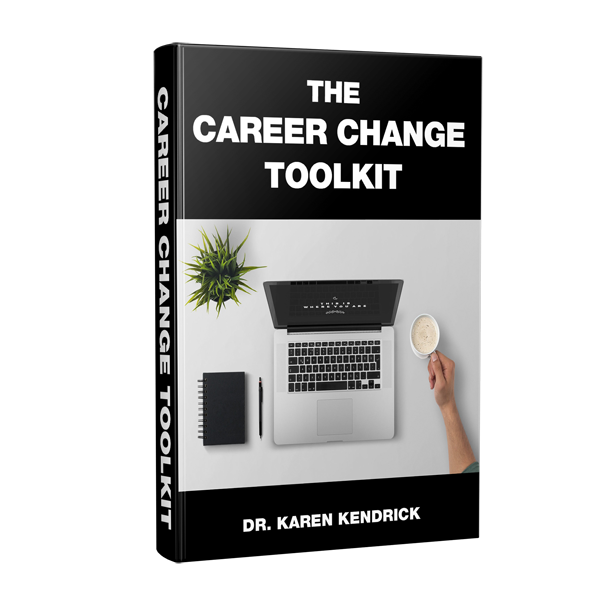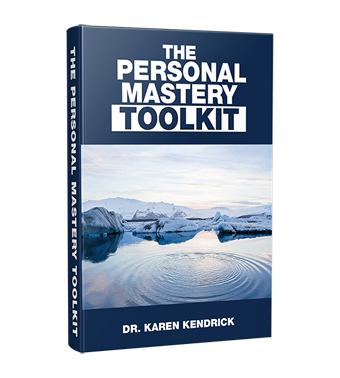9 PRINCIPLES FOR MANAGING AND THRIVING IN YOUR CAREER
ABOUT THE EPISODE
Wonder how some people seem to really enjoy their work and have a career they love? Learn 9 career management principles to help you thrive.
TRANSCRIPT
Like anything in life, you get out of your career what you put into it. So if you want one you’ll be happy with, you’ll need the right mindset and approach.
Hey Everyone, it’s Dr. Karen Kendrick, and welcome back to Mastery Now.
I know that so many people over the last few years have been feeling unhappy at work. Whether it’s with the work environment or the remote condition or having to go back to work after being allowed to work from home or something else.
And so it’s not surprising that we’ve seen the numbers of people quitting their jobs on the rise, especially during the height of the pandemic. In one month alone, in November of 2021, over four and a half million U.S. workers quit their jobs. Now, that’s in contrast to about 3 million for an average month before the pandemic, so that’s a pretty big shift.
Now, the reasons cited weren’t necessarily even due to the pandemic itself, although childcare issues did come up as a top concern for some people. The other factors were things like lack of opportunities for advancement, feeling disrespected, having low pay, and so on.
There was also some data to suggest that people aren’t just quitting their jobs, they’re changing their careers. In fact, there was another study that CNBC reported about that said that 53% of U.S. adults that did quit their jobs in 2021 also made a career change. So it wasn’t just about going and finding the same type of work somewhere else.
So that’s a lot of unhappy people for a variety of reasons. So I thought it might be a good time to talk about some practical ideas for managing your career, whether you’re in between jobs right now, or working for a company, or whether you’re even self-employed. So I’m going to walk you through nine career management principles that I hope will guide you as you think about the work that you do and how long you choose to stay doing it.
So principle number one is just to know what you really want from your career. Now, this could be anything from creative expression, intellectual challenge, maybe a way to grow and learn, or a chance to make a difference. Or maybe it’s just simply a way to provide for your family or have a flexible life or have a chance to travel and meet people. There’s really no right or wrong answers here, and it’s often more than one thing. But as soon as you’re clear on what you want, you can start managing your time and effort according to that.
Now, recently there was this great interview with Glen Powell. He’s one of the young actors that’s featured in the new movie “Maverick: Top Gun.” And Glen asked Tom to give him some advice about how to choose the right roles. And of course, this is because Tom Cruise has been incredibly successful with most of the roles that he’s taken. So Tom answers by saying, “Well, what kind of career do you want to have?”
So I think this is so important because I see many times that people have these very high expectations for what they want to achieve, or be paid, or what job title they want. But they may not always be willing to put in the time or effort to get it. Or they’re just not clear on what’s really important to them. And they wind up taking jobs or going into a line of work that doesn’t really make them happy.
So I think it’s really helpful to think about this. Get as clear as you can, so you can avoid choosing things that don’t serve you or don’t take you where you want to go. Now, I recognize that your interests or needs can change over time, so just keep checking in with yourself so that you’re as clear as you can be, and then know that it’s okay to change your mind if you want to move in a new direction at some point.
But bottom line, just keep thinking about where you want to go. What aspirations do you have. And then start getting as clear around the details on that so that you can make the right investments and choices that match up with where you want to go.
Now, I also recognize that luck and timing and opportunity can play a part in the trajectory of where you go in your career. And this is fine. I recognize that that can happen, but it really is mostly about putting in the time and the effort to have what you want.
Now, that all being said, if what you really want is work-life balance or just job stability, but not necessarily upward mobility, that’s fine too. It’s just helpful to know that and then manage your time and actions according to that. But if you do have high expectations about what you want to achieve or where you want to go, then get clear on the specifics and be willing to do the work.
The second principle, principle number two, is to understand your value in the marketplace. And I’m talking about the current marketplace, not from a year or two ago. Things change all the time in terms of demand for certain skills or experience or background. And so you’ve got to really be clear about what kinds of salary or perks or pay raises or whatever that you might be able to command based on what’s happening.
So it could be based on the economy, or what’s happening in certain industries, or who else your competition is, what current unemployment rates are, etc. So you’ve got to look at all these factors and you’ve got to stay on top of it.
And I say this because I think it’s so easy to either overestimate or underestimate what you’re really worth. And this comes into play so much when it comes to salary negotiations or asking for a pay raise or a promotion or whatever. So you’ve got to really stay on top of this. Do your research. Find out what other jobs in that similar industry, at that same level, with those same skills and experiences, are really offering in terms of pay or where you can live, or promotion rates, that kind of thing. So find out as much as you can. Stay on top of this.
And if you’re self employed, you’ve also got to really know what you can charge for your services or products based on what your competition is doing. Now, some people may say, well, you could charge more if you have more of a premium product or service, or you have more experience. And if so, that’s fine. But you just have to be clear on exactly what it is you have to offer and what it is that you’re really worth.
Now just know, of course, this changes all the time. So that’s why I keep emphasizing that it has to be what’s current. Stay on top of these changes so that when it comes time to negotiate or get paid what you’re worth or charge what you want for your services, you’ll have the best chance of getting that.
Principle number three is to optimize your learning in every job and situation. You’re only going to get out of as much as you put into something. And no matter what job you have, no matter how little or how much you might enjoy it, is an opportunity to learn and grow. So, even if you don’t plan to stay in a particular role for very long, try to make the most of it. Take time to put in the hours, especially if you’re new to a role, to learn what you need to learn.
And expect that you’re going to be working harder or even longer hours during the initial few months to get up to speed. And if you really want to advance in that role, then do more than what’s expected. Take initiative to ask for more responsibility or special projects. And again, even if you eventually decide that a job or career choice is no longer what you want, you’ll have gained the most possible while you were in that particular job.
I think a lot of people just put in the bare minimum because they think it’s not worth it. And the reality is though, is that they’re missing a great opportunity to gain more knowledge or skill or experience and perspective that can be transferred and applied somewhere else.
And the other reason to keep learning and growing on the job is because it’s easy to get complacent, and before you know it, your skills aren’t up to date. Or even worse yet, they’re obsolete. Or you’re just stagnating emotionally and mentally and you’re no longer challenged. So make sure you’re always adding to your knowledge and skills, even if it’s not specifically about your job. It could be about the business or the industry or the current economy you’re in or whatever. Remember, there’s always more ways to grow than you think.

FIND WORK YOU LOVE
Get world-class training to unleash your talents and do your most inspired work.
Now, principle number four is to be proactive and take control of your destiny. Remember, no one’s going to manage your career for you. Your boss or your company doesn’t always see employee growth or advancement as their top priority. In fact, most of the time they’re too busy working on other stuff.
So you’ve got to be the one out there looking ahead and proactively finding opportunities to do more or learn more and contribute more. And if you feel stagnant, then ask for more responsibilities or special projects. Or ask to attend some training or a conference or whatever.
But also keep in mind that the best way to get opportunities and advancement is to go above and beyond and not just do the bare minimum. Take initiative and be assertive and ask for feedback about how you’re doing, and how you can do better.
And if you’re really unhappy, then have the conversation, even if it’s tough, with your boss. Don’t wait until you’ve already decided to leave. Give your boss a chance to see if there is something they can do to keep you. For most bosses, it’s a bigger headache to replace you and train someone new than to work a bit to keep you happy. So don’t underestimate the potential upside to having the conversation about your work tasks, or your pay, or whatever you feel needs fixing.
Principle number five is to avoid over-staying in a role or jumping ship too quickly. And this is because timing is so important in managing your career. I’ve seen some people stay too long in a role that they’ve outgrown just for the sake of convenience. Now, that can be okay if you’re getting other things out of the role that you think are worth it, like a steady paycheck or health benefits.
But if fulfillment in the work that you do is really important to you, and you’re just sticking around because you don’t think you can find something else, or you don’t want to put in the effort, then I really encourage you to take a good look at things. Many times there are more opportunities out there, even in a slower economy. So be willing to put in the time and effort now to be more fulfilled elsewhere, rather than just atrophy in your current role and live out your days feeling bored or miserable.
Now in converse, you also don’t want to leave too quickly if there’s a chance that things might improve. You don’t want to get the reputation of bouncing around too much. Even though it’s more acceptable these days than in the past to leave jobs maybe just after a year or two, depending on the industry or type of role you’re in, you also don’t want to look too unstable to potential employers, and have too many gaps in your resume or too many short term roles.
So just be careful with that in your thinking and decide whether you think you can really afford to leave after a short amount of time. So bottom line, just choose your timing carefully. Don’t stay too long, but don’t jump too quickly.
Principle six is just to keep building relationships and managing your network. Relationships are a great resource for information, for finding new job leads, for learning and growing, for making decisions about your career, and helping you do your current job better. So take time to invest in nurturing and growing who you interact with and who you meet. Don’t just see people as a means to an end that you only seek out when you need something. Make sure that you’re really making it mutually beneficial, and that you’re putting in some time to get to know people and add value to them.
It’s also always a good idea to take the high road and keep your conflicts to a minimum. You know, word can travel fast both inside and outside wherever you’re working about any major issues working with other people. And that can damage your reputation.
Another thing to do is just keep expanding your network. You can never have too many contacts. So get out there and make it a point to meet new people, whether it’s online, or at a conference, or a networking event or whatever. And this will really help you when it comes time to look for a new position or career. The more people you know, the better your chances it will lead to some additional opportunities.
And then finally, once you leave a job, stay in touch with any coworkers that you felt a strong connection with. Not only because it feels good and can help you keep growing, but because you never know where it might lead or how they might be able to help you down the road.
Principle seven is to master the art of feedback. If you really want to grow and advance in your career, you’ve got to get comfortable with receiving constructive input. If you’re always defensive or in denial of what people tell you you need to work on, then you’re not going to get as far as you’d like.
Instead, take the mindset that this is just information that’s going to help you move ahead. It’s not an assault on your character or your intentions, it’s just there as a guide. And even if you don’t fully agree with the feedback or you don’t like how it’s being given or who was giving it, then try to see if there’s any kernel of truth there and what’s being said.
The most successful people learn to have a thick skin and keep moving and get the feedback, take it to heart, and then take action to improve. And if you really want to move along in your career even faster, don’t wait to be told. Ask for feedback. Ask, “How am I doing?” “What else do you see here that I could improve on?” “What would you like to see more of from me? Or less?” These are really powerful questions and conversations to have, and the sooner you embrace them, the better off you’ll be.
Principle number eight is just to find good mentors. It’s always helpful to get advice from people who have certain expertise or greater experience than you do. Mentors can help you sound out your ideas, or solve problems, make decisions, and maybe even lead you to new opportunities.
Now, these could be at your current place of work, or outside of work, or even a family member or friend with specific knowledge. And it could be somebody that really knows your field or industry well, or even somebody without that background, who can give you great advice and insight because they bring a completely new perspective.
But either way you go, make sure that it’s somebody that has your best interests in mind, as well as will make time for you, and is willing to be objective and honest. Because if they’re not willing to give you any tough feedback or say what they really think, that’s not really going to be that helpful for you. They may be a great cheerleader, but that’s not really what you’re looking for here.
Bottom line, whoever you choose, just make sure that you’re offering them some value as well. If they’re going to take the time out of their busy schedule to help you, see if there’s something that would be useful to give back to them. Even though most mentors often see their roles as to be the one giving, you’ll keep your people much more motivated to help you when they see that you’re interested in helping them too.
And that brings us to the last principle, principle number nine, which is to make good departures. If you really want to have your best success in your career, you need to avoid burning bridges. If you need to leave a job, have a good exit plan and do it with grace. Remember that most of the time, leaving your job is an inconvenience for your employer, so try to make it easy on them. Keep their interests in mind, and do what it takes to leave on good terms.
So that means being professional in how you give notice, in terms of how you let your boss know before others. Following it up in writing if needed. And avoiding any strong negativity or abruptly just leaving. And if it’s helpful or appropriate, consider putting together a transition plan to hand things off to whoever is going to take your job, even if that person hasn’t been identified yet.
And then also, kind of common sense, leave your workspace tidied up and your projects well-documented, so that you make it easy for whoever that next person coming along is.
And then I also recommend thanking your boss or others that you’ve learned from there, for the opportunity. Even if in the end you didn’t feel that positive about the company, the role, or your boss, now is the time to take the high road. Do yourself a favor by leaving a positive final impression.
So I hope this has been helpful in terms of giving you some ideas about managing your career and hopefully thriving in it. Just remember, at the end of the day, there are many ways to feel satisfied and enjoy your work. And how much effort and time you want to put into your career is totally up to you. But when you do focus on being intentional with your choices and actions, you’ll give yourself the best chance of getting the rewards that you want.

Get a FREE copy of The Career Change Toolkit!
Jumpstart your journey to finding work you love.
IF YOU LIKED THIS CONTENT, CHECK OUT:
HOW TO MAKE A SUCCESSFUL CAREER CHANGE
NEW TO KAREN?



